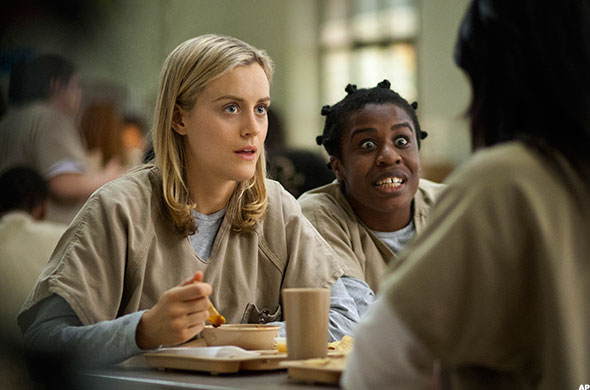Time Warner isn’t worried about whether a stand alone HBO will prompt pay-TV subscribers to cut the cord, or whether other networks will do the same. The decision, announced Wednesday, to offer the entertainment company’s popular HBO network as a stand-alone subscription service sometime in 2015, is all about Netflix.
In a decade, Netflix has gone from being an aggregator of movies and television shows to an aggressive buyer of original programming, an enormous transition. It’s also the same path HBO followed as it became the foremost producer of high-quality television serials.
Netflix’s steady revenue stream has given CEO Reed Hastings plenty of cash to get into original programming. The success of House of Cards and Orange is The New Black speaks to Netflix’s financial prowess, and its aspirations. Don’t forget, on any given evening in the U.S., Netflix accounts for more broadband usage than any other service, and that includes Google‘s YouTube.

At Time Warner’s investor conference Wednesday, HBO CEO Richard Plepler repeatedly rejected the notion that an HBO stand-alone service will cannibalize pay-TV. The decision to go “over-the-top,” the industry term for set-top boxes that stream video to the television, Plepler said, is all about going after the 10 million U.S. homes that have an Internet connection but don’t subscribe to pay-TV. It’s about going after the additional 70 million homes that get pay TV but don’t get HBO.
Plepler didn’t scream “Netflix,” but he could have.
“HBO had to do this, and in truth, they should have done this a year ago,” said Shahid Khan, co-founder of Mediamorph, the New York-based media industry software and data provider. “Netflix has basically taken a page from the HBO playbook, and they’re doing it as a digital network channel. HBO faces a much bigger threat from Netflix than any other channel on pay-TV. They had to do this.”
Starting sometime next year and at a yet-to-be-announced price, fans of Game of Thrones or True Detective will no longer be required to have a cable-TV subscription to access HBO on their tablets and smart phones. That’s quite a change, and yes, it does have the potential to change the pay TV model. But for the moment, this isn’t about payTV, it’s about Netflix.
And although CBS (CBS) said it plans to do something similar with Showtime, and somewhere down the road 21st Century Fox (FOXA – Get Report) could do the same with FX or Viacom (VIAB – Get Report) with MTV, those channels don’t yet have compelling enough programming to expect that viewers will subscribe to them in meaningfully large enough numbers, Kahn said. For Showtime, FX and MTV, Netflix isn’t their biggest competitor.
(CBS did announce Thursday that it’s starting a $5.95 per month streaming subscription service called CBS All Access that will show primetime programming the day after they air as well as past seasons of series such as The Good Wife and Blue Bloods. For CBS, the move appears to be more about generating additional revenue than offsetting a particular rival.)
Thinking big picture, Plepler wants to win over the cord-cutters or ‘cord-nevers,’ viewers who aggregate their own entertainment menu with Netflix, Google‘s (GOOG – Get Report) YouTube and a myriad of other online sites. Judging by the fact that Netflix has 36.3 million paid U.S. subscribers (and another 14.4 million paid outside the U.S.), HBO wants to compete with its biggest rival on its home turf, the Internet. And these viewers just happen to be comprised largely of millennials, young people who don’t watch much of their television sitting on a couch. These are also consumers whom advertisers and brands such as HBO are keen to attract.
A stand-alone HBO offering, Plepler said could generate “hundreds of millions of dollars” of additional revenue, which is certainly nice, but it’s the fact that these particular viewers have embraced Netflix rather HBO that Time Warner made this move.
And while Netflix CEO Reed Hastings had to explain Wednesday during his company’s third-quarter investor call why its fourth-quarter subscriber forecast missed analyst estimates, the simple fact remains for Time Warner: Netflix isn’t going away. In fact, the miss had everything to do with expenses tied to growth: European expansion and the cost of original programming. If anything, Netflix is growing, albeit at a slower rate than it did in the second quarter.
“The magnitude of the threat that HBO faces from Netflix, most other cable networks don’t have that threat,” Kahn said. “For HBO, this is really a defensive move. There is no one else who is going to eat their lunch the way Netflix is eating HBO’s lunch.”
Time Warner gained 4.4% on Thursday to close $75.41 as Bank of America Merrill Lynch upgraded the shares to buy from hold. Meanwhile, Netflix tumbled 19% to $361.70 after saying its fourth quarter would be challenging because of increased expenses.